
ChangeThis
ChangeThis is our weekly series of essays from today's thought leaders that are meant to evoke conversation by bringing forth new and unique ideas.
ChangeThis
-
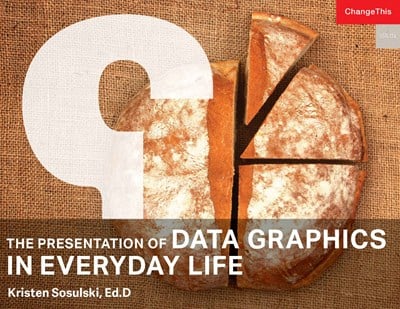
Blog / ChangeThis
The Presentation of Data Graphics In Everyday Life
By Kristen Sosulski
"Consider how our smartphones, social media platforms, or even search engines alter the pace, pattern, and scale of our daily activities. Think about your own process for selecting restaurants, documenting moments, and sharing your thoughts with others and the role that your media plays in these activities. Next, consider pictorial representations of data, or data graphics as a medium. How have data graphics proliferated their presence in our everyday life. Navigation systems guide us from one location to another through narrated directions accompanied by digital maps, annotated with points of interests like the nearest coffee shops, shoe stores, or art museums as alternative pathways to peak our interest and reroute us from our original destination. Aside from navigation aids, data graphics accompany news reports, research findings, and advertisements as both supporting evidence and alternative narratives. [. . . ] [. . . ] When used with integrity and purpose, data graphics have the potential to help us, as humans, make sense of this intensely data focused world.
Categories: changethis
-
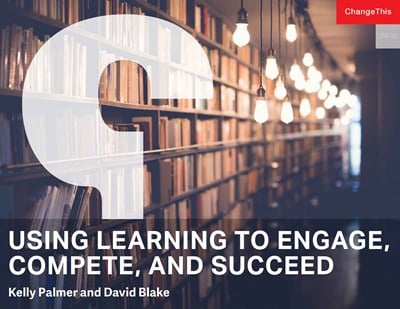
Blog / ChangeThis
Using Learning to Engage, Compete, and Succeed
By Kelly Palmer, David Blake
"The world of work is going through a large-scale transition—much like the transition we went through from the agricultural economy to the Industrial Revolution. We are now in the age of digitization, automation, and acceleration—an age where critical skills and expertise will be an imperative for us to succeed in the economy. [...] If you aren't ready and willing to learn every day and keep up with a rapidly changing world, you can't and won't stay competitive. Gone are the days when you could graduate with a four-year degree and feel secure that you had learned everything you needed to know to stay relevant for your entire career."
Categories: changethis
-
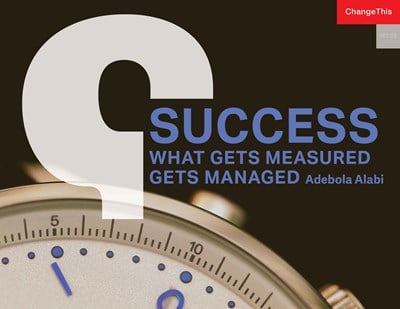
Blog / ChangeThis
Success: What Gets Measured Gets Managed
By Adebola Alabi
"Don't we all desire to be winners in our various field of endeavor? Wouldn't you want to stand tall and get ovation from your friends and loved ones after achieving a feat? Everyone desires to win in life; we all want to be successful in everything we do. It is no secret that everyone, whether young or old wants to be champions and achieve success in whatever they do. People want to excel in sports, academics, business, career, finances, health, relationships, and in spiritual life. Why do some succeed, while others failed, why are some so far behind in the game of life while others are well ahead? Why does it seem like everything goes very well for some while others appear to be struggling in everything they do? What does it take to become a champion? Can anyone win in the game of life and become as successful as they desire?"
Categories: changethis
-
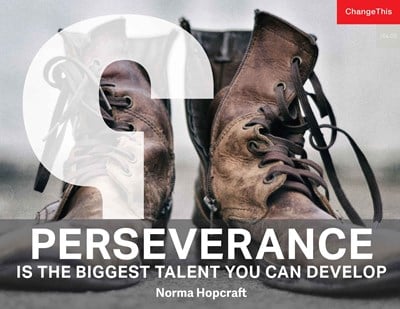
Blog / ChangeThis
Perseverance Is the Biggest Talent
By Porchlight
"After losing my way in life, just a bit, I re-launched a writing career—a childhood dream—and began to send work to literary magazines. I was bursting with hope for affirmation of my great skill and broad experience. Editors would be glad I sent them work. I would be a literary star. I sent out stories and essays confidently at first. Months later I would get a reply in the mail—from The Paris Review, for example (I'm a sucker for the biggest names). I would stand motionless, desperate for acceptance, floating amongst the stars with hope. I'd slip my finger under a loose corner of the flap and tear. Take the slip of paper and hold it up to my near-sighted eyes. The pain of rejection dragged me from the stars into the red-hot magma at the core of the earth. I'd get a letter from a lit magazine and cringe at the pain I was about to feel. I would try to cut off hope—it seemed easier than to be disappointed again. Then I'd hope against hope, wishing for that surge of affirmation from being accepted.
Categories: changethis
-
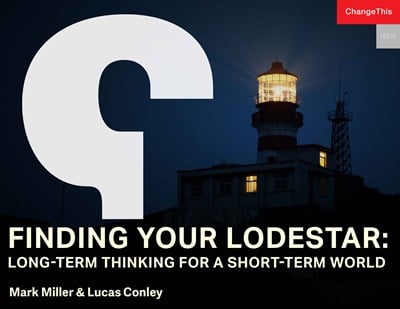
Blog / ChangeThis
Finding Your Lodestar: Long-Term Thinking for a Short-Term World
By Mark Miller, Lucas Conley
"In 1968, Andy Warhol proclaimed, 'In the future, everyone will be world-famous for 15 minutes. ' With the advent of memes and viral videos, we now live in that future—one in which any trending joe (or his grumpy cat) can make a quick buck. So why is all this short-termism leaving so many of us feeling shortchanged. We now live an increasingly short-term world, one where the products we buy often outlive the brands that make them. It's not just the inherently trendy brands. All brands are equally susceptible to the traps of short-term thinking. In the face of change, short-term thinkers see a fork in the road—choosing to either cling to what worked in the past or abandon it in an effort to reclaim the spotlight. Therein lies the key difference we at The Legacy Lab have observed between short-term thinkers and their long-term counterparts: The former focus only on their immediate circumstances—their 15 minutes of fame. The latter aspire to a lifetime of significance. ".
Categories: changethis
-
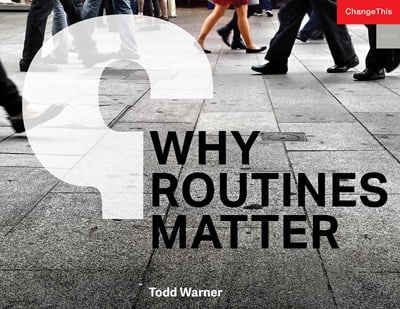
Blog / ChangeThis
Why Routines Matter
By Porchlight
"The number of articles about successful people's habits are innumerable. Dating back to The 7 Habits of Highly Successful People by Stephen Covey, we've been obsessed with what it takes to do well. But for most people who work in large organizations, it is not that easy. Their lives are not defined by the ability to design their own habits, or routines; their work lives emerge from the environment that they work in, and the forces—operational, hierarchical, and functional—that exert themselves on their daily lives. Successful people in these environments, we've found, have routines that are distinct to their social systems, and these routines differentiate their performance."
Categories: changethis
-
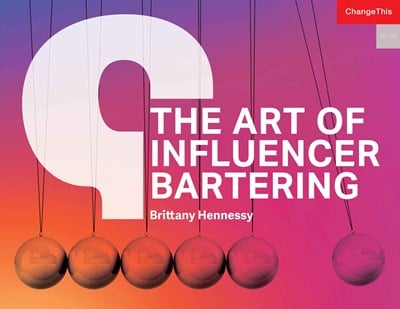
Blog / ChangeThis
The Art of Influencer Bartering
By Brittany Hennessy
"It may seem like everyone has a blog, or a social channel they want you to follow, and that's because it's true. It has never been easier to turn your expertise into a revenue stream and becoming an influencer will help you do just that. Let's start with the most important questions: What exactly are influencers and why are they important. In general, an influencer is someone who has influence. I know, I know, it isn't very helpful to define a word by using the same word, but sometimes things really are that simple. Word-of-mouth marketing is nothing new and it's probably the driving force behind most of your consumer habits, whether that's buying a product, binge-watching a show, or downloading an app. But in today's digital world, the word 'influencer' is most commonly ascribed to someone who has clout through her digital channels, or as some like to call it, 'social currency. ' Whether she has a lot of followers or really high engagement, when she speaks, her audience listens, they act, and—most importantly to brands—they buy.
Categories: changethis
-
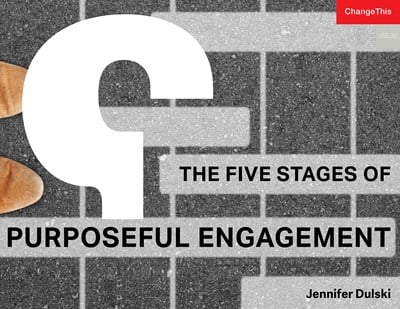
Blog / ChangeThis
The Five Stages of Purposeful Engagement
By Jennifer Dulski
"While at Change. org, I got a unique perspective into the world of decision-makers because of the more than one thousand campaigns started every day on the site asking people and institutions for change. From the data, I've seen that there are a series of predictable stages decision-makers tend to go through as they react to campaigns that are directed at them. I call them the Five Stages of Engagement: denial, listening, acceptance, embracing, and empowering. Not all decision-makers go through each of the five stages, but we do see each of these stages play out on a regular basis. Understanding the stages can help you be more effective in persuading decision-makers that you are working to influence. In particular, helping decision-makers see the risks that come from denial and the benefits that come from listening and then acting can help you make your own case more persuasive. For the purposes of describing each stage briefly below, I've referenced petitions to corporate decision-makers, since they take place in a shorter time frame and clearly demonstrate each stage.
Categories: changethis
-

Blog / ChangeThis
A Boss Life
By Emily Thompson, Kathleen Shannon
"No matter how you've come to entrepreneurship, you may find yourself needing some direction. You're just trying to figure it out as you go, and guess what—so is everyone else! This manifesto is here to give you the guidance you crave and to let you know we're in it together. Being boss is a constant practice, and after three years of hitting publish on our podcast (and now a book) we've learned that it's conversation that is constantly evolving. Here are some key patterns and foundational insights we've picked up along the way."
Categories: changethis
-
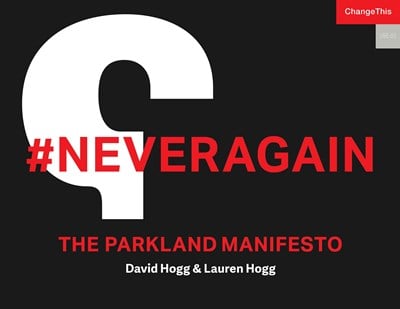
Blog / ChangeThis
#NeverAgain: The Parkland Manifesto
By David Hogg, Lauren Hogg
We stood up and tried to make our voices heard. We’re really proud of what we have accomplished so far, and are so grateful to all the people who have joined our cause. They gave us strength. They gave us hope. You give us hope. But let’s face it—it’s not enough. And the merchants of chaos keep peddling their wares.
Categories: changethis
The original idea behind ChangeThis came from Seth Godin, and was built in the summer of 2004 by Amit Gupta, Catherine Hickey, Noah Weiss, Phoebe Espiritu, and Michelle Sriwongtong. In the summer of 2005, ChangeThis was turned over to 800-CEO-READ. In addition to selling and writing about books, they kept ChangeThis up and running as a standalone website for 14 years. In 2019, 800-CEO-READ became Porchlight, and we pulled ChangeThis together with the rest of our editorial content under the website you see now. We remain committed to the high-design quality and independent spirit of the original team that brought ChangeThis into the world.

